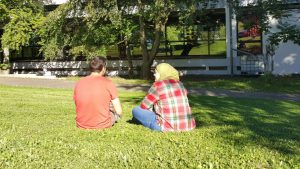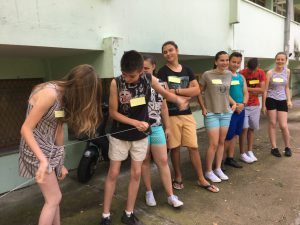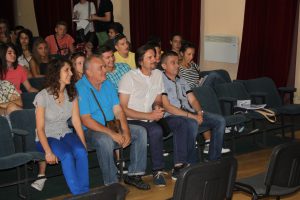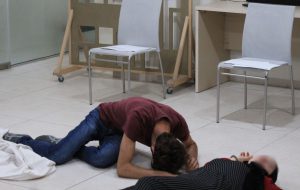Non-violent – conflictual
What is it all about? What does dialogue mean for us?

The Project Speak up – Dialogue across Borders facilitates dialogues between youngsters and young adults from war- and conflict zones and strives to establish an exemplary peace practice. The dialogues are not bound to any preconditions, other than the willingness and openness to talk and listen to each other. They are consciously designed in an open manner, no settlements/agreements and no premature gestures of reconciliation are expected as this could lead to important issues not being discussed but being subordinated to this goal. The seminars focus on the process and the collective discussion of past and/or present conflicts. This means to get to know the Others as humans with their truth and their everyday reality. The seminars intentionally are addressed to young people with diverse educational and social backgrounds who are not likely to be potential decision-makers or already part of existing organizations. Speak up sees itself as a grassroots initiative and aims to support civil society and its initiatives. We share the goals of improving the local political reality and contributing to the realization of a just peace. This requires awareness of and sensitivity to asymmetrical power structures and privileges as well as mechanisms of discrimination and prejudice. We aim to encourage the participants to clearly position themselves towards their political reality and critically question also their own societies.
About the Concept of the Encounters in the Former Yugoslavia
Due to the projects’ history in the Former Yugoslavia the work of Speak up initially did not have a very specific methodology or concept from which the encounters were built. Rather, the current concept grew throughout the years based on the experiences of our local partners. In the first years of the project, an important aspect of the encounters – apart from having the children get to know the alleged “enemy” – was to offer children a vacation from their difficult living situation during and right after the war. However with time, the encounters focused more on political issues. Through the decision to work with youngsters instead of children from 2004 onwards, this development intensified.

The engagement with history, the wars and the current socio-political situation and developments within the respective countries turned to be the main focus of the encounters. At the moment, the first days of the encounters focus around building trust towards and getting to know the Others; afterwards the youngsters address different current social and political topics through different workshops.

In the second half of the encounter, the focus is on the concrete engagement with the wars in the region and their effects on the present situation. This also is addressed through workshops, lectures, theater performances or films. Apart from the political workshops, joint leisure activities play an important role throughout the encounters. The concept aims to enable the youngsters to become active for peace and change in their respective societies. Towards the end of the two-weeks long encounter, a first opportunity to become active is a public performance, which the youngsters organize collectively.
Furthermore, after the encounter, the participants find a variety of opportunities to actively engage in action for peace within our partner organizations, through follow-up weekend visits and follow-up peace camps organized by the cross country network “Youth United in Peace”.
About the Concept of the Dialogue Seminars for young adults from Israel and Palestine

Most of our partners work with the “political narrative” methodology. This approach structures the Dialogue Seminars based on three narrative core areas: participants, in a first step, share their personal story, afterwards they focus on their families’ histories and finally, on the collective history of the respective groups. Representatives of this approach consider that the safe space of dialogue must not contribute to ignoring or making invisible power asymmetries and the lack of equal footing and its consequences in the reality of the conflict between the conflicting parties inside the seminars. Therefore, they consider necessary not only an individual but intentionally collective dialogue as well as explicitly discussing the dynamics of occupation and conveying the larger responsibility of the stronger conflict party for the solution of the conflict and change of the human-rights violating reality.

Apart from the political-narrative approach, our partners have also worked with further methods and concepts such as theater as a means for conflict transformation or media education. In 2019, for the first time, within one of the seminars, a concept which combines the political-narrative approach with non-violent communication tools was applied.
